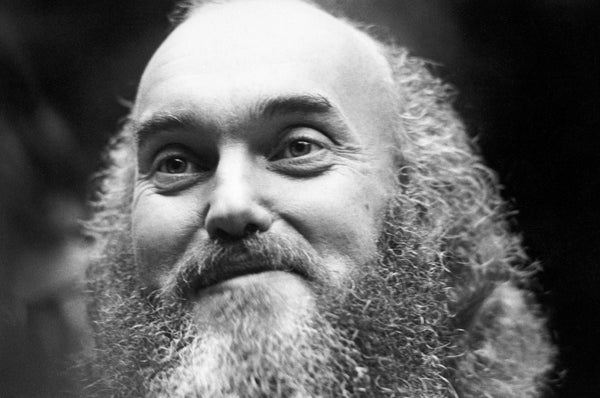This article was published in Scientific American’s former blog network and reflects the views of the author, not necessarily those of Scientific American
Baba Ram Dass, the Harvard psychology professor turned guru, who convinced me and others in my generation to chase enlightenment, is dead. Born Richard Alpert, Ram Dass has drifted in and out of my life since my youth. In the early 1970s I read his bestseller Be Here Now, which argued that enlightenment consists of just, well, being here now.
In the mid-1970s I heard Ram Dass riff on this message in a packed auditorium at the University of Colorado. Bald and bearded, dressed in a luminous white robe, he enthralled us young seekers with his funny, cool schtick. So I recall. Last year, I kept thinking “be here now” when I was on a silent Buddhist retreat. And Ram Dass kept popping up in conversations at a symposium at Esalen, the spiritual retreat center, that I attended a few weeks ago.
To commemorate the man, I’ll tell a little tale about him. It begins in 1999 when I interviewed psychedelic explorer Terence McKenna in New York City. McKenna said he doubted a famous anecdote in Be Here Now involving Neem Karoli, a.k.a. Maharajji, a guru whom Ram Dass met in India in 1967 and who gave him his new name. Maharajji was so enlightened, Ram Dass wrote, that “he’s not identified with the world as most of us identify with it. If you didn’t watch him, he’d just disappear into the jungle or leave his body.”
On supporting science journalism
If you're enjoying this article, consider supporting our award-winning journalism by subscribing. By purchasing a subscription you are helping to ensure the future of impactful stories about the discoveries and ideas shaping our world today.
When Maharajji asked Ram Dass for “medicine,” Ram Dass gave him three pills, each containing 305 micrograms of LSD, a very strong dose. The guru gulped down all three pills. “All day long I’m there,” Ram Dass wrote, “and every now and then he twinkles at me and nothing—nothing happens!”
LSD didn’t affect Maharajji, Ram Dass implied, because the guru already had such a profoundly mystical outlook. This message corroborated the overarching theme of Be Here Now, that spiritual practices such as meditation and yoga can induce the same powerful mystical states as psychedelics but in a more stable, permanent fashion.
Back to Terence McKenna. He questioned whether anyone, no matter how enlightened, would be unaffected by 915 micrograms of LSD. He conjectured that Maharajji, wanting to impress his American devotee, pretended to consume the LSD through sleight of hand. The gurus McKenna met in his travels in the East were certainly capable of such trickery. “I saw outrageous shenanigans,” McKenna said.
In 2001, Paul Krassner, another sixties icon and old friend of Ram Dass, seemed to confirm McKenna’s doubts about Ram Dass’s story. Writing in the counterculture magazine High Times, Krassner stated that Ram Dass “now admits that he made up the story he told American seekers about the time he gave his guru in India three tablets of LSD and nothing happened.”
I got Ram Dass's number and called him. He had suffered a cerebral hemorrhage several years earlier, and his voice was shaky. But he insisted that his Maharajji anecdote was true, and that he had never told Krassner or anyone else otherwise. When I emailed Krassner to inform him of Ram Dass’s response, Krassner said that to the best of his recollection the anthropologist Stanley Krippner told him that Ram Dass had retracted the Maharajji/LSD story.
When I emailed Krippner, he replied that Krassner must have misunderstood him. “I would have no reason to doubt Ram Dass' story as it was originally stated,” Krippner told me. I called Krassner back to tell him what Kripper said. Krassner (who died last summer) was still sure he had heard about Ram Dass’s confession from someone. But he retracted his claim and apologized to Ram Dass in a subsequent issue of High Times. The old quip comes to mind, that anyone who remembers the sixties wasn’t really there.
Like McKenna (killed by brain cancer in 2000), I doubt the story of the acid-gobbling guru, as I do Ram Dass’s claim that Maharajji had psychic powers. (The guru supposedly intuited, correctly, that Ram Dass’s mother had just died of a spleen disorder.) As McKenna told me, western seekers were eager to believe that eastern adepts had supernatural abilities.
But Ram Dass was right about a lot of things, notably that we should all try to be here now more often. Don’t regret the past or fret over the future, just pay attention to the weird, weird present.
Further Reading:
Mind-Body Problems (free online book, also available as Kindle e-book and paperback)
A Buddhism Critic Goes on a Silent Buddhist Retreat
Can Mysticism Help Us Solve the Mind-Body Problem?
What Does It Feel Like to Be Enlightened?
